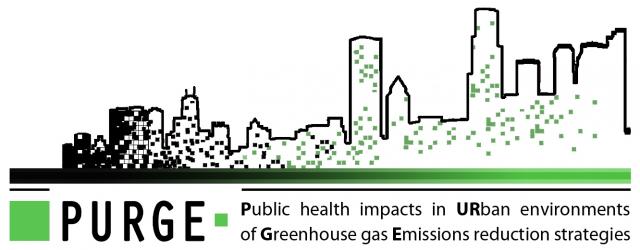PURGE
| Public health impacts in URban environments of Greenhouse gas Emissions reduction strategies |  |
|
|
The project will examine the health impacts of greenhouse gas (GHG) reduction policies in urban settings inEurope, China and India, using case studies of 3-4 large urban centres and three smaller urban centres. Sets of realistic interventions will be proposed, tailored to local needs, to meet published abatement goals for GHG Emissions for 2020, 2030 and 2050. Mitigation actions will be defined in four main sectors: power generation/industry, household energy, transport and food and agriculture. The chief pathways by which such measures influence health will be described, and models developed to quantify changes in health-related ‘exposures’ and health behaviours. Models will include ones relating to outdoor air pollution, indoor air quality and temperature, physical activity, dietary intake, road injury risks and selected other exposures.
|
||
|
Integrated quantitative models of health impacts will be based on life table methods encompassing both mortality and morbidity outcomes modelled over 20 year time horizons. Where possible, exposure-response relationships will be based on review evidence published by the Comparative Risk Assessment initiative or systematic reviews. Uncertainties in model estimates will be characterized using a mathematical framework to quantify the influence of uncertainties in both model structure and parameter estimates. Particular attention will be given to economic assessments, both in terms of behavioural choices/uptake of various forms of mitigation measure (with new surveys to address evidence gaps), and in terms of health benefits and costs calculated from societal, health service and household perspectives. A decision analysis framework will be developed to compare different mitigation options. |
||
|
Start date: February 2011 |
End date: July 2014 |
|
|
Call: FP7-ENV-2010 (European Commission) |
||
|
Partners in the PURGE consortium: |
||
|
London School of Hygiene and Tropical Medicine (United Kingdom) - Coordinator |
||
|
Key people involved in BC3: |
||
|
Prof. Anil Markandya |
||
|
Results: The overall project aim is to quantify the positive and negative impacts on health and well-being of greenhouse gas reduction strategies in urban areas of Europe, China and India, and to develop and present the evidence in ways that are most relevant to major policy decisions in such areas as energy, housing/built environment, transport, and food. Specific objectives:
|
||
|
Website: purge.lshtm.ac.uk/project |
||
 |
||
